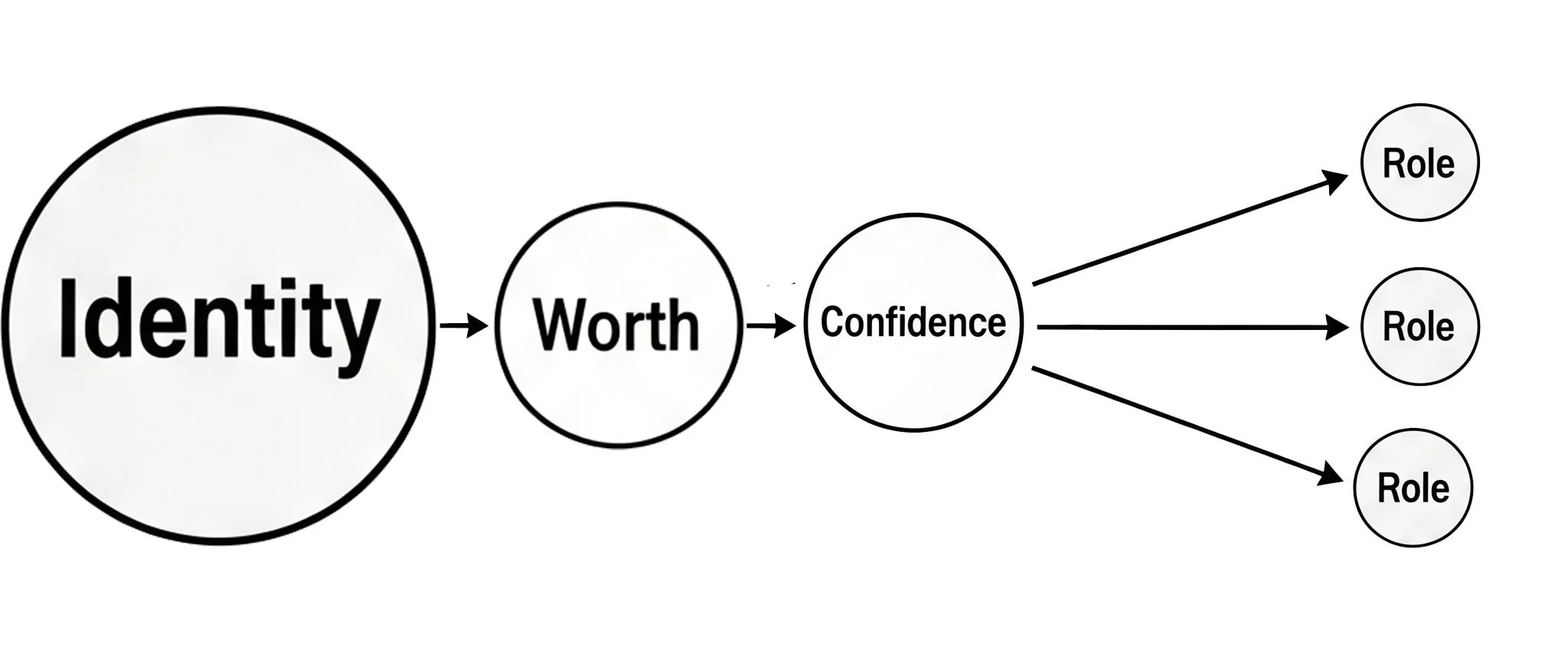Identity and Roles
“CJ, you are a husband, you are a father, you are a therapist. Those roles are very important to you. But is that all you are—or maybe that’s all you think you are?”
A therapist once challenged me with this. I was caught off guard, irritated. I tried to prove them wrong, but when it came time to finish the sentence, I had nothing. I can still remember pointing my finger, insisting, “I know who I am, I am…” and then silence.
Roles matter. I wanted to be a husband, a father, a therapist. They are blessings I chose and value deeply. They describe what I do and how I live my life. But somewhere along the way I let them become the finish line of the sentence: “I am good because…” Without them, I felt like nothing unfinished, incomplete, a failure. My confidence lived and died on how others saw me in those roles. If I felt I was failing in one, I overcompensated in another. It was like constantly trying to balance an equation built on recognition, acceptance, and approval.
When that’s the case, every perceived failure becomes personal. My mistakes became declarations about who I was: “I always mess this up. I never get that right.” When the applause wasn’t there, I’d slip into resentment: “I’m the only one doing this.” My worth became measured in performance, and when I wasn’t noticed, irritation, sadness, and insecurity filled the space.
When our roles define our identity, our self-worth becomes dependent on our performance. Our confidence is no longer rooted in who we are, but in how well we do something. This can lead us to a flawed perception of our own worth, and ultimately, a distorted view of our identity.
Roles are what we want others to see. They’re neat, understandable, acceptable. The danger is when we confuse them with identity when the point of the role becomes about being celebrated instead of being rooted in who we already are.
It’s a lot like a diagnosis. A diagnosis is descriptive, not definitive. Yet people often mistake it for identity: “I am bipolar” instead of “I have bipolar.” The diagnosis doesn’t declare who you are it’s just a shorthand, a snapshot. Roles work the same way. They are adjectives, not nouns. They point to us, but they aren’t us.
Confidence doesn’t come from nailing the role. It comes from grounding ourselves in who we are. Watch a basketball player at the free-throw line. Make it or miss it, they reset, same routine, same focus. Their identity isn’t hanging on that one shot. They trust the process, not the outcome. When we confuse failure with identity, we choke on the very thing we’re desperate to get right.
When I was a teenager, I spent a few spring breaks backpacking the Appalachian Trail. We’d hike for days, sleeping in tents at night. The tent only stayed secure if it was staked down. Without those stakes, a gust of wind or even a middle of the night bathroom run meant coming back to find it blown away.
That’s identity. If we don’t stake our worth into the ground of who we are, the winds of failure, rejection, or recognition will move us anywhere.
When we ground ourselves in the true story of who we are, we create a solid foundation for our actions and decisions. We declare our own value, and our confidence is no longer dependent on the outcome of our performance. This provides us with a clear lens through which we can interact within our roles.
This is the work I do with clients: reclaiming the ability to finish the sentence “I am good because…” from within as we engage with affirming thoughts of self. And yes, affirmations can feel unbearably cringey. They sound too positive, too simple. But when we lean into the cringe, something shifts. We rediscover what has been true all along.
Roles point us back to what’s already there. As a therapist, spouse, father, I see in myself: compassion, persistence, creativity, kindness, determination, reliability. These are identity traits. The roles only reveal them. When I remember them, I drive the stakes deeper. That way, when storms hit a fight with my wife, losing a job, letting my kids down I might feel pain, yes, but I’m not undone. Pain doesn’t equal the end. Failure doesn’t equal finality. Pain reminds me I’m still alive, still here, still fighting.
For me, faith is where I anchor deepest. It’s where I return when I need to remember who I am.
I am created with intent.
I am designed with purpose.
I am formed in God’s image.
I am loved beyond measure.
My strength and confidence are rooted in Jesus.
These are truths that don’t shift, even when life does.
But if affirmations feel too much, gratitude is another path. Gratitude isn’t submission. It isn’t false positivity. It’s noticing how we’ve shown up—and letting it point us back to who we are.
For example: I’m grateful for electricity. I have electricity because I paid the bill. I paid the bill because I have a job. I have a job because I’m skilled and qualified. From that one line of gratitude, I can see: I am responsible, determined, capable. Gratitude leads back to affirmation, and affirmation leads back to gratitude.
Rediscover, Don’t Reinvent
Finding identity doesn’t require reinventing yourself. It’s not about becoming someone new. It’s about slowing down, reflecting, and rediscovering what’s already true.
We set intention (what we’re committed to growing toward).
We affirm (finishing the sentence, “I am good because…”).
We practice gratitude (noticing how we’ve shown up and will again).
When we do this, we anchor identity. We declare our own value. We set boundaries we never thought possible. And we grow confidence that isn’t dependent on how well we perform our roles.
Roles matter but they don’t get to define us.


